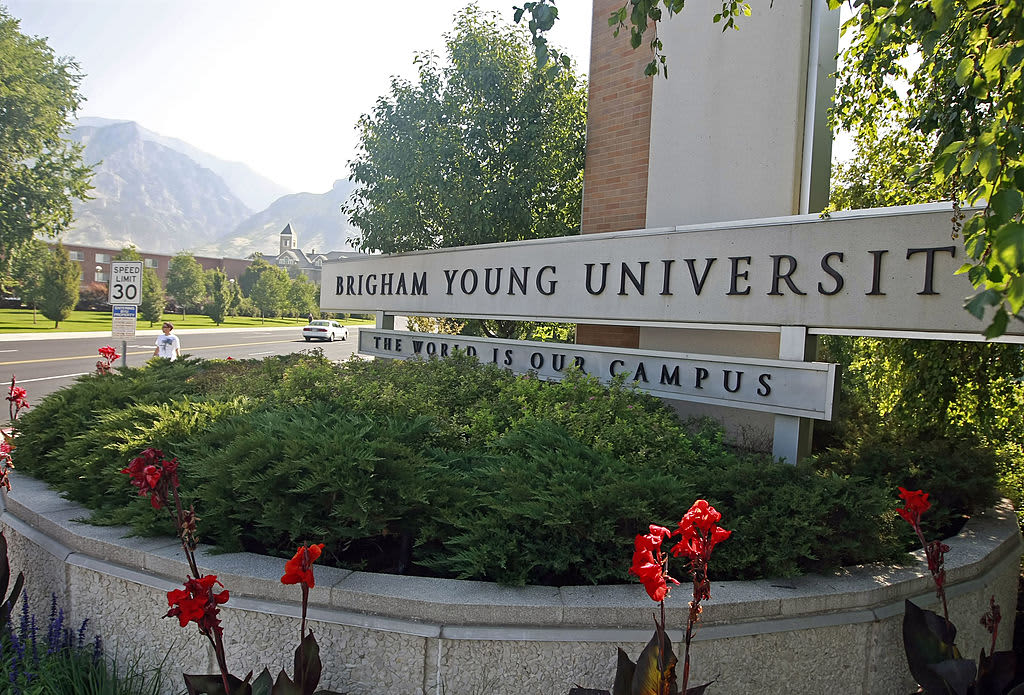MBA Programs in Utah Overview
Utah’s economy is growing: According to IBISWorld, from 2017 to 2022, the state’s gross domestic product (GDP) increased at an annualized rate of 1.3% per year. Its trailing GDP over that same period ranked Utah highest of all 50 states.
IBISWorld also reports the three sectors that contributed the most money to Utah’s economy in 2022 were manufacturing; real estate and rental and leasing; and professional, scientific and technical services. These three industries accounted for 38.1% of the state’s GDP that year.
Utah’s growing economy may signal increased demand for professionals with business knowledge. You can advance your career and explore new industries by pursuing an MBA degree in Utah. Roles this graduate-level credential can help you qualify for include general and operations managers, accountants and auditors, and project management specialists.
Eight schools offer MBA programs in Utah. These programs have different learning modalities, including fully in-person and fully online. Some professional MBAs let you take all of your classes in the evenings, while others meet only during weekends.
In this guide, we explore three of Utah’s MBA programs and careers MBA graduates can pursue in the state.
| 2021 Population | 3,337,975 |
|---|---|
| Climate |
|
| Number of Higher Learning Institutions | 27 |
| Per Capita Income | $33,378 |
| Fortune 500 Companies | 0 |
Sources: U.S. Census, Current Results, NCES, Statista
Featured Online Programs
Learn about start dates, transferring credits, availability of financial aid, and more by contacting the universities below.
3 Business Schools in Utah

Brigham Young University
Founded in 1850, the University of Utah is the state’s flagship public institution. The university enrolled almost 35,000 students in the 2022-23 school year.
David Eccles School of Business
The David Eccles School of Business offers four MBA programs. These include a full-time MBA with day and evening classes, a professional MBA with evening-only classes, a fully online MBA, and an executive MBA with classes every other Friday and Saturday.
Programs take 21-26 months to complete. The full-time MBA is four semesters long, while the executive MBA takes five semesters to finish. The professional and online MBA programs require six semesters of coursework.
According to the university, MBA students see a positive return on investment for their degrees: For example, in 2019, graduates of the full-time MBA program saw a 105% average salary increase. University data also reveals that 90%-95% of students in the full-time MBA receive merit-based scholarships.
David Eccles’ MBA Specializations
Accounting | Entrepreneurship | Information Systems | Marketing | Management | Finance | Operations/Supply Chain
Applying to the U
Each of the four programs has its own requirements and application deadlines. Most of the programs require at least 1-2 years of work experience. Some programs, including the professional MBA, also require that you work full time as you complete your degree.

Brigham Young University
Brigham Young University (BYU) is among the few postsecondary institutions that holds religious affiliation with the Church of Jesus Christ of Latter-day Saints (LDS). The private college enrolled nearly 35,000 students in the 2022-23 school year.
Marriott School of Business
BYU’s Marriott School of Business aims to foster “inspired leadership.” The MBA program attracts many LDS members by offering discounted tuition and fees for church members — as of 2023, LDS members pay $15,076 per year in tuition, while non-members pay $30,152.
The program does not allow enrollees to work during the first year of the program, though students complete a summer internship and can work part time in the program’s second year. BYU’s MBA offers a team learning structure that places learners into small groups of varied backgrounds to strengthen their cooperative and collaborative skills as they complete coursework.
Marriott’s MBA Specializations
Entrepreneurship | Finance | Operations and Supply Chain | Marketing | Strategic Human Resources
Applying to BYU
Students have three paths to apply to BYU: You can submit a GMAT score, a GRE or LSAT score, or apply for a test waiver. After you submit your application, the school may schedule an interview before making an admission decision.

Utah State University
Utah State University (USU) is the state’s only public land-grant research university. Located in Logan, Utah, USU enrolled over 27,000 students in the 2022-23 school year.
Jon M. Huntsman School of Business
The Utah State MBA program at the Jon M. Huntsman School of Business offers three versions of this graduate-level credential. Students complete these degrees in 1-2 years.
The executive MBA is designed for working professionals and offers weekly night classes. In-person enrollees can take courses at the school’s Logan and Thanksgiving Point campuses, while students in the live online program tune in to synchronous virtual broadcasts of class lectures.
Learners can also enroll in the fully online MBA, where they complete 36 credits of coursework at their own pace. The online program holds accreditation from AACSB International.
Applying to USU
USU admits students for fall, spring, and summer semesters. To apply, learners submit an application, resume, statement of purpose, letters of recommendation, and transcripts. Applicants may also complete an interview.
Why Go to College for an MBA in Utah?
Earning your business degree in Utah can help you make networking connections with companies and other professionals in the state, especially useful for students who plan to work in Utah after graduation.
Several Utah MBA programs only admit small classes each year: For instance, BYU’s class of 2023 was composed of only 145 enrollees, while the entering class of full-time MBA students at the University of Utah comprised just 50 learners in 2022. Smaller programs often mean more opportunities for individualized instruction and career insights from faculty.
If you are a member of the Church of Jesus Christ of Latter-day Saints, BYU’s MBA is the only program of its kind for future Mormon business leaders. In addition to discounted tuition, LDS MBA students at BYU can also apply for funding like the Cardon International Sponsorship.
Accreditation for Utah Schools
Prospective colleges and universities on your list should hold institutional accreditation. Accreditation verifies a school’s academic quality and accountability. Many colleges and universities in Utah hold institutional accreditation from the Northwest Commission on Colleges and Universities.
Some business schools in Utah also undergo programmatic accreditation — an optional process that evaluates how well a program’s curriculum prepares graduates for careers in the field. Some institutions, including the University of Utah, hold business programmatic accreditation from AACSB International.
Paying for Your MBA Degree
MBA degrees can help workers qualify for advanced roles and higher salaries. However, paying for these degrees can be costly, especially if you choose an out-of-state or private school.
Financial aid options like scholarships, fellowships, grants, and loans can help defray your educational expenses. Scholarships, fellowships, and grants do not require repayment, but student loans require repayment with interest, so consider your options carefully.
Some schools may award financial aid automatically with your acceptance, while other schools may require a separate application to qualify you for assistance.
Utah maintains a scholarships and aid programs page to connect students to funding opportunities. Prospective MBA enrollees can also investigate each institution’s internal pages related to fellowships, scholarships, and other aid.
| Average Tuition and Fees | National |
|---|---|
| Public Institution | $12,394 |
| Private Nonprofit Institution | $28,445 |
| Private For-Profit Institution | $14,301 |
Source: NCES
In-State Versus Out-of-State Tuition
According to data from the National Center for Education Statistics, the average graduate tuition for public schools is lower than the average graduate tuition at private and for-profit institutions. However, in-state tuition is more affordable than out-of-state tuition, though some online programs at public institutions offer in-state tuition to all learners regardless of residency status.
Cost of Living in Utah
World Population Review‘s cost of living index defines “cost of living” as how much it costs to pay for necessities like food, shelter, transportation, and healthcare in a state. This index scores the national baseline as 100, so states scoring below 100 are less expensive than average and states above 100 are more expensive than average.
Utah’s cost of living — 99 — is slightly below the national average, with expenses like groceries, utilities, and housing all likewise falling below the national score.
Careers for MBA Graduates in Utah
In 2022, U.S. News & World Report ranked Utah the top state in the country overall as well as the number one state in its economy rankings. Provo, Ogden, and Salt Lake City, some of Utah’s largest cities, also ranked in the top 25 of Forbes’ “The Best Places For Business And Careers” report in 2019.
The Governor’s Office of Economic Opportunity in Utah has named sectors like life sciences and healthcare, financial services, software and IT, and aerospace and defense as targeted industries, shifting resources toward the development of these areas of business. Many of these industries employ professionals who hold MBAs.
Below, we explore common careers for MBA-holders in Utah.
Popular MBA Careers in Utah
General and Operations Managers
General and operations managers use data and financial records to make decisions and improve organizational efficiency. They lead one or more operational areas like marketing, customer service, or special projects. Utah employed over 60,000 general and operations managers in 2020.
Job Outlook in Utah (2020-30):+31%
Accountants and Auditors
Accountants and auditors prepare and examine companies’ financial documents, including reports, budgets, and other documents. They also serve in advisory roles, suggesting how decision-makers should use financial information to make business and operational decisions. The state is projected to add almost 4,500 accountant and auditor roles between 2020 and 2030.
Job Outlook in Utah (2020-30):+33.4%
Project Management Specialists and Business Operations Specialists
Project management specialists coordinate operations, budgets, personnel, and other activities necessary to complete specific projects. They often serve as points of contacts for clients. Projections Central data projects 2,680 annual job openings in this field from 2020 to 2030.
Job Outlook in Utah (2020-30):+27.5%
| Career | Utah Employment | Utah Average Annual Salary | National Average Annual Salary |
|---|---|---|---|
| Accountants and Auditors | 14,300 | $77,260 | $86,740 |
| Administrative Services Managers | 2,160 | $111,370 | $115,640 |
| Advertising and Promotions Managers | 210 | $119,050 | $147,050 |
| Budget Analysts | 390 | $79,810 | $87,680 |
| Chief Executives | 3,270 | $195,920 | $246,440 |
| Compensation, Benefits, and Job Analysis Specialists | 890 | $72,930 | $75,920 |
| Financial Analysts | 2,760 | $74,490 | $108,790 |
| Financial Managers | 8,270 | $138,660 | $166,050 |
| Fundraising Managers | 180 | $89,120 | $124,450 |
| General and Operations Managers | 60,960 | $100,260 | $122,860 |
| Management Analysts | 6,390 | $87,340 | $104,660 |
| Marketing Managers | 5,110 | $129,900 | $158,280 |
| Project Management Specialists | 12,830 | $90,850 | $101,610 |
| Public Relations Managers | 530 | $108,660 | $150,030 |
| Purchasing Managers | 430 | $108,610 | $140,650 |
| Sales Managers | 5,730 | $139,550 | $150,530 |
| Securities, Commodities, and Financial Services Sales Agents | 3,400 | $74,690 | $100,740 |
| Training and Development Managers | 500 | $108,690 | $132,100 |
Source: U.S. Bureau of Labor Statistics
The data in the table above reveals many business careers in Utah offer average salaries below the national averages for these roles. However, this may be partly explained by Utah’s overall lower-than-average cost of living. Furthermore, these wages each exceed the average salary for all workers in Utah, which the BLS reports was $57,360 in 2022.
Questions About Business Schools in Utah
Does the University of Utah have a good business school?
According to the David Eccles School of Business at the University of Utah, the majority of graduates from their four MBA programs experience beneficial outcomes after earning their degree, including increased salaries and promotions. These positive returns on investment may signal that employers value job candidates with advanced credentials from this institution.
Is it expensive to get an MBA in Utah?
The cost of an MBA in Utah varies by school. Utah residents pay less than out-of-state students at public universities. LDS enrollees at Brigham Young University’s program pay less if they are members of the Church of Jesus Christ of Latter-day Saints.
What is the hardest college to get into in Utah?
According to the U.S. Department of Education’s College Scorecard, the most selective Utah postsecondary institution is Brigham Young University (BYU), which only admits 59% of undergraduate applicants. Note that this data does not cover master’s programs, so admission rates for MBAs may differ.
What HBCU business schools are in Utah?
Utah has no historically Black colleges and universities (HBCUs), though the University of Utah and Utah State University have partnership agreements with HBCUs around the country.
Explore More College Resources

Best Online MBA Programs
These top online MBA programs can help you save money, work while you study, and start a lucrative business career.

by Meg Embry
Updated December 9, 2024

